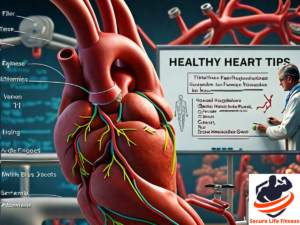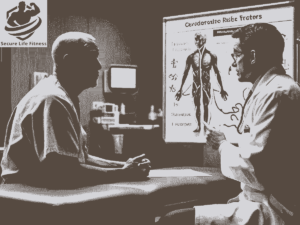Table of Contents
ToggleHeart to Heart
Cardiovascular health is a critical aspect of our overall well-being, and neglecting it can have severe consequences. Our heart is a vital organ that pumps life-giving blood throughout our body, supplying oxygen and nutrients to our cells. However, many of us take our heart health for granted, ignoring the warning signs and risk factors that can lead to serious cardiovascular diseases. In this blog post, we will delve into the importance of cardiovascular health, the risks and warning signs of cardiovascular disease, and provide tips on maintaining a healthy heart.
What is Cardiovascular Health?
Cardiovascular health refers to the well-being of our heart, blood vessels, and circulatory system. It encompasses the ability of our heart to pump blood efficiently, our blood vessels to transport oxygen and nutrients, and our circulatory system to maintain healthy blood pressure and flow.
Why is Cardiovascular Health Important?
- Life-Saving: Cardiovascular health is crucial for our survival. Our heart pumps blood throughout our body, supplying oxygen and nutrients to our cells.
- Quality of Life: Good cardiovascular health ensures we can perform daily tasks without fatigue, shortness of breath, or pain.
- Reduced Risk: Maintaining cardiovascular health reduces the risk of heart attacks, strokes, and other cardiovascular diseases.
Risk Factors for Cardiovascular Disease
- Age: Risk increases after 65
- Gender: Women are more vulnerable following menopause, while men are more vulnerable overall.
- Family History: Genetic predisposition
- Smoking: Doubles the risk of heart disease
- High Blood Pressure: Uncontrolled hypertension
- High Cholesterol: Elevated LDL (bad) cholesterol
- Diabetes: Uncontrolled blood sugar
- Obesity: Excess weight
- Lack of Exercise: Sedentary lifestyle
- Unhealthy Diet: High sodium, sugar, and saturated fat intake
Warning Signs of Cardiovascular Disease
- Chest Pain: Angina or heart attack
- Shortness of Breath: Difficulty breathing or fatigue
- Dizziness: Lightheadedness or fainting
- Swelling: Edema in legs, ankles, or feet
- Palpitations: Irregular heartbeat
- Fatigue: Unexplained tiredness
Maintaining a Healthy Heart
Lifestyle Changes
- Exercise Regularly: At least 150 minutes of moderate-intensity aerobic exercise
- Healthy Diet: Balanced diet low in sodium, sugar, and saturated fat
- Maintain a Healthy Weight: BMI between 18.5 and 24.9
- Quit Smoking: Nicotine cessation programs
- Limit Alcohol: No more than one drink per day for women and two drinks per day for men
Medical Interventions
- Medications: Blood pressure, cholesterol, and diabetes medications
- Cardiovascular Procedures: Angioplasty, stenting, or bypass surgery
- Regular Check-Ups: Annual physicals and blood work

Common Cardiovascular Diseases
- Heart Attack: Blockage of blood flow to the heart
- Heart Failure: Insufficient blood pumping from the heart
- Arrhythmia: Irregular heartbeat
- Peripheral Artery Disease: Blockage of blood flow to legs and arms
Emerging Risk Factors
- Inflammation: Chronic inflammation
- Lipoprotein(a): Elevated Lp(a) levels
- Apobec-1: Elevated Apobec-1 levels
- Omega-3 Index: Low omega-3 levels
Nutrition and Cardiovascular Health
- Heart-Healthy Foods: Avocados, nuts, fatty fish, fruits, and vegetables
- Omega-3 Rich Foods: Fatty fish, flaxseeds, chia seeds, and walnuts
- Potassium-Rich Foods: Bananas, leafy greens, and sweet potatoes
- Foods High in Fibre: Vegetables, whole grains, fruits, and legumes
Stress and Cardiovascular Health
- Chronic Stress: Increased risk of cardiovascular disease
- Stress Management: Meditation, yoga, deep breathing, and exercise
Sleep and Cardiovascular Health
- Adequate Sleep: 7-8 hours per night
- Sleep Deprivation: Increased risk of cardiovascular disease
Heart-Healthy Recipes
- Grilled Salmon with Avocado Salsa
- Roasted Vegetable Soup with Quinoa
- Spinach and Feta Stuffed Chicken Breast
- Brown rice paired with a vegetable and lentil curry
- Greek Yogurt with Berries and Walnuts
Heart-Healthy Snacks
- Fresh Fruit and Nuts
- Carrot and Celery Sticks with Hummus
- Protein Smoothie with Banana and Spinach
- Dark Chocolate Square (70% cocoa)
- Air-Popped Popcorn with Herbs and Spices
The Importance of Cardiovascular Health for Women
Cardiovascular disease is often thought of as a men’s health issue, but it is just as important for women to prioritize their heart health. In fact, heart disease is the leading cause of death for women in the United States, accounting for one in every four female deaths.
The Role of Hormones in Cardiovascular Health
Hormones play a crucial role in cardiovascular health, particularly for women. Estrogen, in particular, has been shown to have protective effects on the cardiovascular system. However, during menopause, estrogen levels decline, which can increase the risk of cardiovascular disease.
Pregnancy and Cardiovascular Health
Pregnancy can also have a significant impact on cardiovascular health. Women who have had preeclampsia or gestational diabetes during pregnancy are at increased risk of developing cardiovascular disease later in life.

Menopause and Cardiovascular Health
The chance of cardiovascular illness might also rise during menopause. Decreasing estrogen levels can lead to changes in blood vessels, making them less flexible and increasing blood pressure.
The Importance of Cardiovascular Health for Children
Cardiovascular health is not just important for adults, but also for children. Children who are overweight or obese are at increased risk of developing cardiovascular disease later in life.
The Role of Nutrition in Cardiovascular Health
Nutrition plays a critical role in cardiovascular health. A diet high in fruits, vegetables, whole grains, and lean protein can help to reduce the risk of cardiovascular disease.
The Role of Exercise in Cardiovascular Health
Exercise is also crucial for cardiovascular health. Regular physical activity can help to lower blood pressure, improve blood flow, and reduce the risk of cardiovascular disease.
Stress and Cardiovascular Health
Stress can also have a significant impact on cardiovascular health. Chronic stress can increase blood pressure, heart rate, and the risk of cardiovascular disease.
Sleep and Cardiovascular Health
Sleep is also essential for cardiovascular health. Lack of sleep can increase blood pressure, heart rate, and the risk of cardiovascular disease.
The Importance of Regular Check-Ups
Regular check-ups with your doctor are crucial for maintaining good cardiovascular health. Your doctor can help to identify risk factors and develop a plan to reduce your risk of cardiovascular disease.
The Role of Medications in Cardiovascular Health
Medications can also play a crucial role in cardiovascular health. Statins, beta blockers, and ACE inhibitors are all commonly used to reduce the risk of cardiovascular disease.
The Importance of Cardiovascular Health for Overall Well-being
Cardiovascular health is not just important for reducing the risk of cardiovascular disease, but also for overall well-being. Good cardiovascular health can improve energy levels, reduce fatigue, and improve mental health.
Conclusion
In conclusion, cardiovascular health is a critical aspect of our overall well-being. By understanding the risks and warning signs of cardiovascular disease, making lifestyle changes, managing stress and sleep, and incorporating heart-healthy recipes and snacks, we can maintain a healthy heart and reduce the risk of cardiovascular diseases. Recall that a cheerful heart is in good health!













